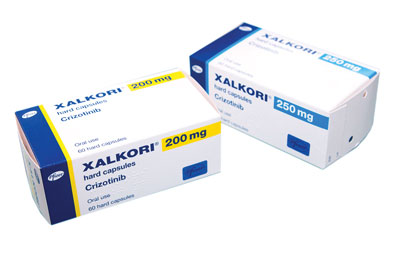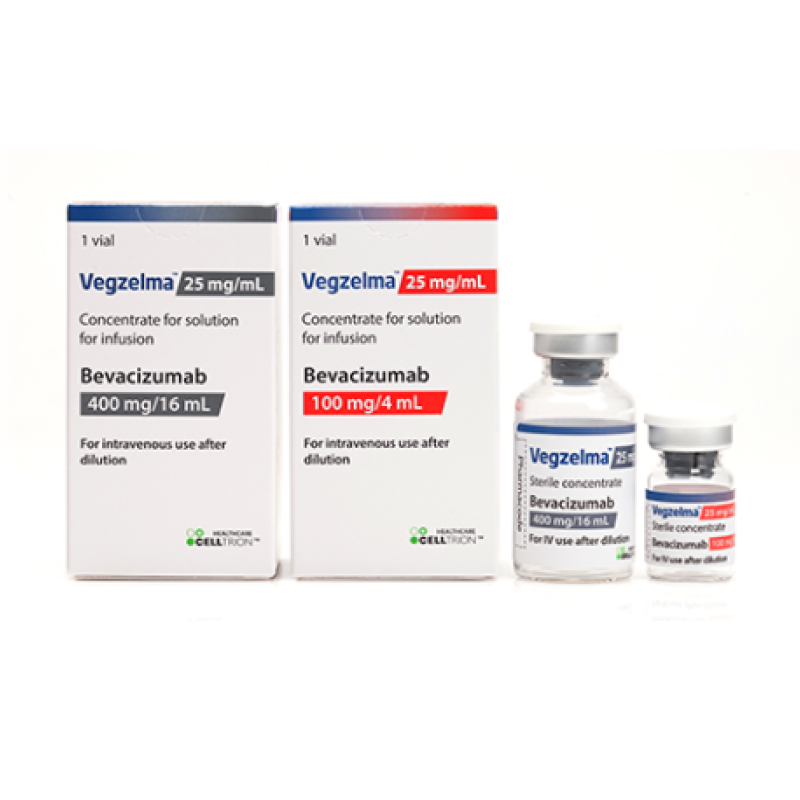Xalkori (crizotinib) vs Vegzelma (bevacizumab-adcd)
Xalkori (crizotinib) vs Vegzelma (bevacizumab-adcd)
Xalkori (crizotinib) is a targeted therapy specifically designed to treat certain types of non-small cell lung cancer (NSCLC) that are positive for the ALK or ROS1 gene mutations, functioning by inhibiting the activity of these proteins to slow down tumor growth. Vegzelma (bevacizumab-adcd) is a biosimilar to Avastin (bevacizumab) and is used in various types of cancer, including certain colorectal, lung, glioblastoma, kidney, and cervical cancers; it works by inhibiting the growth of blood vessels that supply nutrients to the tumors (angiogenesis). The choice between Xalkori and Vegzelma would largely depend on the specific type of cancer a patient has and the presence of particular genetic markers, as their mechanisms of action and indications differ significantly.
Difference between Xalkori and Vegzelma
| Metric | Xalkori (crizotinib) | Vegzelma (bevacizumab-adcd) |
|---|---|---|
| Generic name | Crizotinib | Bevacizumab-adcd |
| Indications | ALK or ROS1-positive non-small cell lung cancer (NSCLC) | Metastatic colorectal cancer, non-squamous non-small cell lung cancer, glioblastoma, metastatic renal cell carcinoma, cervical cancer, and epithelial ovarian, fallopian tube, or primary peritoneal cancer |
| Mechanism of action | ALK and ROS1 tyrosine kinase inhibitor | Monoclonal antibody that inhibits angiogenesis by binding to vascular endothelial growth factor (VEGF) |
| Brand names | Xalkori | Vegzelma |
| Administrative route | Oral | Intravenous |
| Side effects | Visual disorders, gastrointestinal disturbances, edema, elevated liver enzymes, fatigue, decreased appetite | Hypertension, proteinuria, hemorrhage, arterial thromboembolic events, gastrointestinal perforation, impaired wound healing |
| Contraindications | Hepatic impairment, concurrent use of strong CYP3A inhibitors or inducers | Hypersensitivity to bevacizumab or its excipients, uncontrolled hypertension, history of gastrointestinal perforation |
| Drug class | Tyrosine kinase inhibitor | Monoclonal antibody, angiogenesis inhibitor |
| Manufacturer | Pfizer | Celltrion Healthcare |
Efficacy
Efficacy of Xalkori (Crizotinib) in Treating Lung Cancer
Xalkori (crizotinib) is an oral medication approved by the U.S. Food and Drug Administration (FDA) for the treatment of non-small cell lung cancer (NSCLC) that is anaplastic lymphoma kinase (ALK)-positive. It functions as an ALK inhibitor, targeting and binding to the ALK protein to prevent the proliferation of cancer cells. Clinical trials have demonstrated that crizotinib is effective in shrinking tumors and slowing disease progression in patients with ALK-positive NSCLC. The response rate to crizotinib in patients with ALK-positive NSCLC is significant, with many patients experiencing a reduction in tumor size and extension of progression-free survival.
Studies have shown that crizotinib is particularly beneficial for patients with advanced ALK-positive NSCLC, where it has been associated with improved outcomes compared to standard chemotherapy. For instance, the PROFILE 1014 study, which compared crizotinib to chemotherapy in previously untreated ALK-positive advanced NSCLC, found that crizotinib significantly prolonged progression-free survival. Moreover, the overall response rate was higher in the crizotinib group than in the chemotherapy group, indicating its superior efficacy in this patient population.
Efficacy of Vegzelma (Bevacizumab-adcd) in Treating Lung Cancer
Vegzelma (bevacizumab-adcd) is a biosimilar to the original bevacizumab product and is used in the treatment of various cancers, including NSCLC. Bevacizumab is a monoclonal antibody that inhibits vascular endothelial growth factor (VEGF), thereby reducing the blood supply to tumors and limiting their growth. In the context of NSCLC, bevacizumab, when combined with chemotherapy, has been shown to improve survival rates in patients with non-squamous NSCLC. The efficacy of bevacizumab in lung cancer is most notable when used as a first-line treatment in combination with carboplatin and paclitaxel chemotherapy.
The approval of Vegzelma as a biosimilar is based on a totality of evidence demonstrating that it is highly similar to the reference product, bevacizumab, with no clinically meaningful differences in terms of safety, purity, and potency. Clinical trials involving the reference product have shown that adding bevacizumab to standard chemotherapy can lead to a modest improvement in overall survival and a more significant improvement in progression-free survival for patients with advanced non-squamous NSCLC. As a biosimilar, Vegzelma is expected to produce similar efficacy outcomes in the treatment of lung cancer when used in accordance with its approved indications.
Regulatory Agency Approvals
Xalkori
-
European Medical Agency (EMA), European Union

-
Food and Drug Administration (FDA), USA

-
Health Canada

-
Pharmaceuticals and Medical Devices Agency (PMDA), Japan

-
Therapeutic Goods Administration (TGA), Australia

Vegzelma
-
European Medical Agency (EMA), European Union

-
Food and Drug Administration (FDA), USA

Access Xalkori or Vegzelma today
If Xalkori or Vegzelma are not approved or available in your country (e.g. due to supply issues), you can access them via Everyone.org.
How it works

Make an enquiry
Choose the medicine you want to buy, answer a couple of questions, and upload your prescription to speed things up. We’ll get back to you within 24 hours.


Make an enquiry
Choose the medicine you want to buy, answer a couple of questions, and upload your prescription to speed things up. We’ll get back to you within 24 hours.


Breeze through the paperwork
We'll guide you through the required documents for importing unapproved medicine, ensuring you have all the necessary information.


Get a personalized quote
We’ll prepare a quote for you, including medicine costs and any shipping, administrative, or import fees that may apply.


Receive your medicine
Accept the quote and we’ll handle the rest - sourcing and safely delivering your medicine.

Some text on this page has been automatically generated. Speak to your physician before you start a new treatment or medication.
Let's talk
If you have any questions, call us or send us a message through WhatsApp or email:
Contact us




